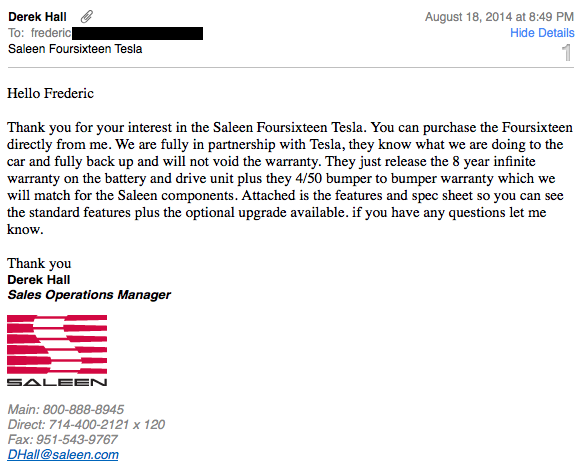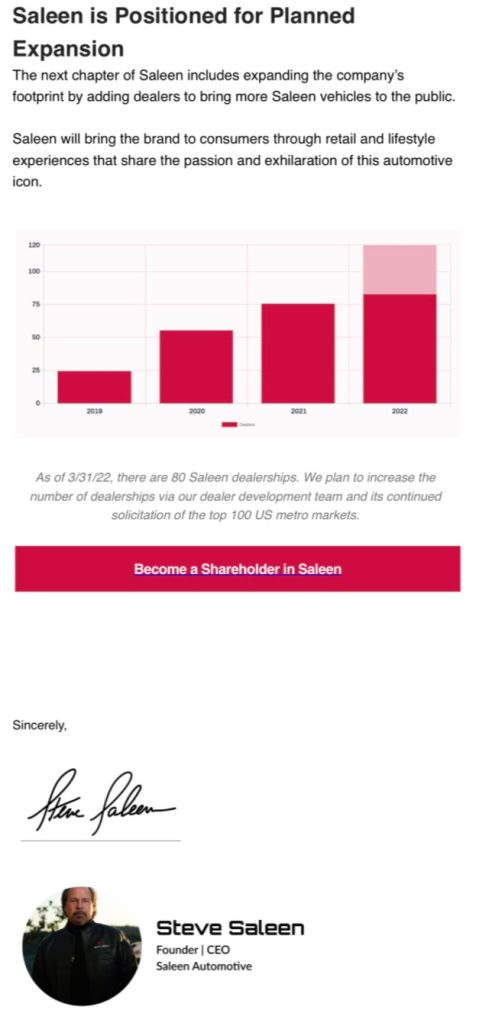
Saleen Automotive has launched a new shady financing effort to bring the company back from the dead, and the legendary car tuner is dangling modified Tesla vehicles in the process again.
Saleen’s troubled history
Saleen is a California-based car tuning company founded by Steven Saleen, a former racing driver turned CEO.
In the late 1990s and early 2000s, it found some success tuning Ford Mustangs. It had a direct relationship with Ford to provide Mustang chassis and many Ford dealerships distributed its Saleen Ford Mustangs. It also launched the Saleen S7 supercar.
At the time, the company was as respected as Roush and Hennessey, who are now seen as the main American car tuners. At one point, Saleen even became a contractor for Ford and had the assembly and paint contract for the Ford GT.
However, it didn’t survive the financial crisis of 2008-2009 and went bankrupt.
A few years later, Steve Saleen tried to relaunch the company, but he had to use some shady financing to make it happen.
The new “Saleen Automotive” was brought public on the penny stock market (OTC) through a shell company owned by a financier named David Weiner, who is known to bring small companies public on the OTC, offering them toxic notes with ridiculous conversion rates, and then dumping those stocks.
After going public and taking millions in convertible notes from those investors, Saleen started to make many announcements about new projects and even electric vehicles, which caught my attention.
Saleen announced that it would tune the Tesla Model S to create the Saleen Tesla Foursixteen.
The company made many claims about the vehicle that were never substantiated. Saleen even claimed to be “in partnership with Tesla” on the project, which was never the case:

Saleen took millions of dollars in customer deposits for the Foursixteen and other vehicles, but it only ended up delivering a few units.
In 2014 and 2015, millions in convertible notes matured and diluted Saleen’s stocks. The investors behind those notes started selling heavily and around the same time, Saleen bought advertising on a penny stock website to promote its stock, and several stock pumpers started promoting the company:
The new shares were unloaded on small retail investors, who believed Saleen would find success with its modified Tesla vehicles and future EV projects they were teasing at the time. The stock went from ~$1 a share to being completely worthless over the next few years, and it was eventually delisted by the SEC after becoming delinquent on its financial reporting.
In 2019, Saleen tried to revive the company again through a partnership with a Chinese automaker, but that failed within a year.
Saleen is Back
Now in 2022, Saleen is trying to do another comeback; if the company’s history is not enough of a warning, there are plenty of new red flags with the latest version of the venture.
Several people sent Electrek a notice of solicitation of investment from Steve Saleen:

Saleen is looking for small investors with a minimum of $500 to invest in the company, which basically amounts to a crowdfunding effort. They are trying to raise of total of about $20 million.
Where things get shady is that people investing in the Saleen offering have to give up their voting proxy to Steve Saleen.
The company wrote in a SEC filing:
Investors in this offering will grant an irrevocable voting proxy to the Company’s CEO that will limit their ability to vote their shares of Common Stock purchased in this offering until the occurrence of certain events specified in the proxy, none of which may ever occur.
In the SEC filing, the company still claims to try to tune Tesla vehicles among others:
Our Saleen Signature Cars are built from base chassis of major American automobile manufacturers, including Ford Mustangs, Ford trucks and Tesla Model S vehicles. We are also working on the development of the Saleen Bronco.
The filing also shows that Saleen’s revenues were down 91% last year to just $2.5 million. The company had a net loss of $3.3 million in 2021. As of the latest reported date (September 2021), Saleen had only $14,000 cash on hand.
Electrek’s Take
I got first interested in Saleen back in 2014 after they announced their Tesla tuning effort. As a kid, I was a fan of the Saleen S7, and I got curious about them going electric, but my interest went away quickly as I looked at the financial dealings around the company.
To me, everything looked like a classic pump and dump. I posted my findings at the time to let other potential investors know, as I expected stock to become worthless due to the toxic convertible notes and no clear path for Saleen to achieve what they claim they would achieve with its Tesla tuning effort.
Saleen ended up suing me to shut me up about those dealings.
Last year, I broke my silence about the situation and explained everything in detail in a Twitter thread that is worth reading if you have about 10 minutes:
All the same people are involved again in this new effort to sell Saleen stock years later. I thought it was worth bringing back up to make sure all the information is out there.
As usual, you should do your due diligence before investing in anything.
Subscribe to Electrek on YouTube for exclusive videos and subscribe to the podcast.
Author: Fred Lambert
Source: Electrek



